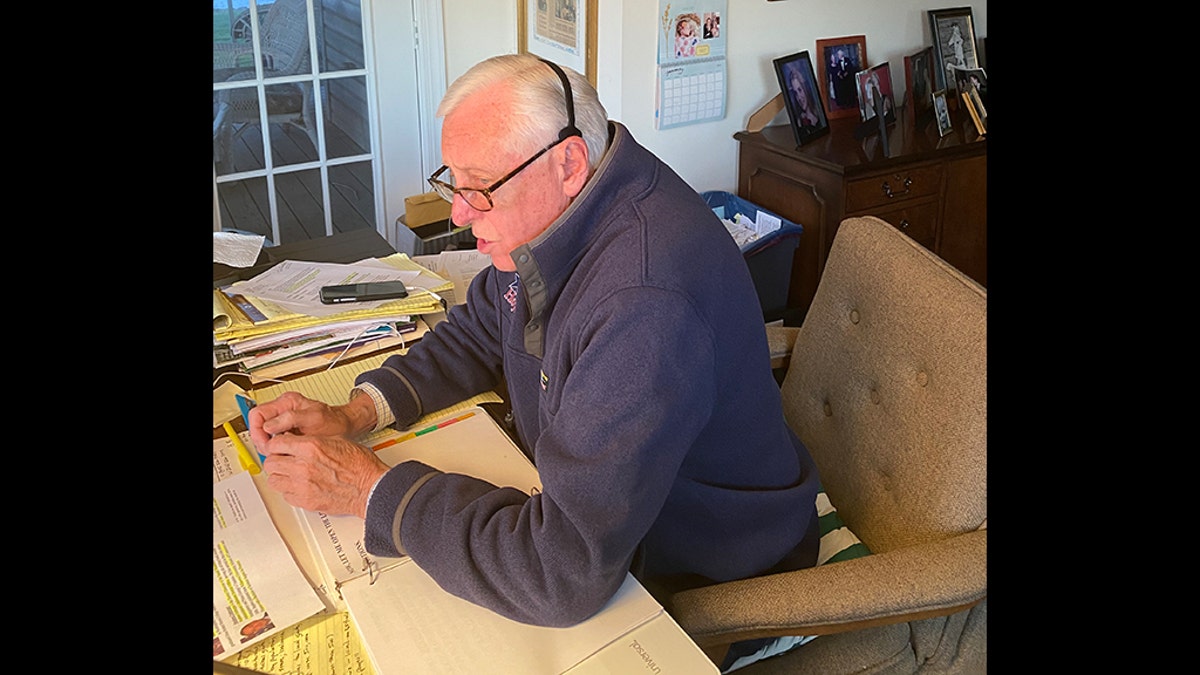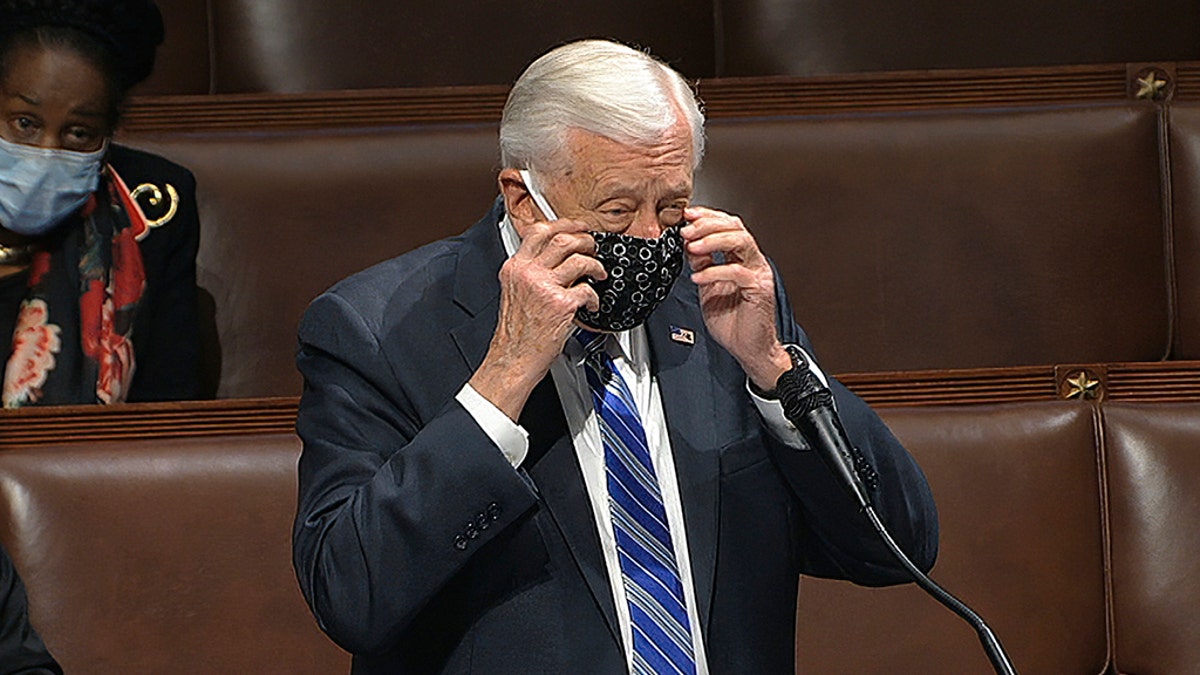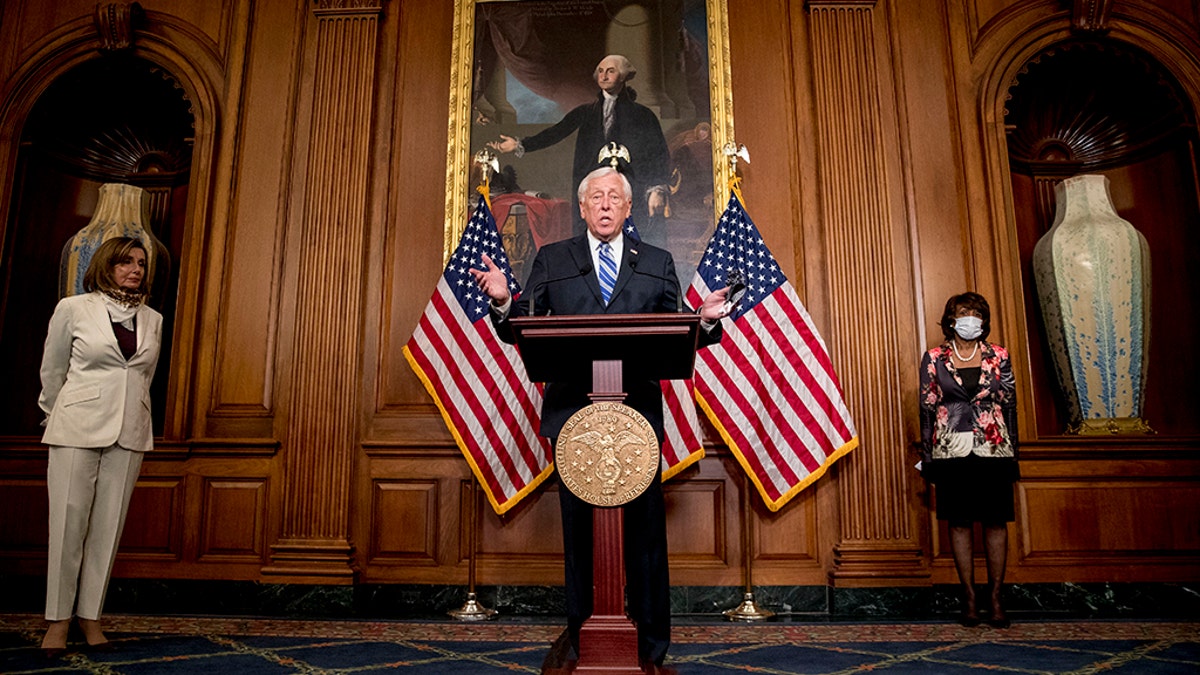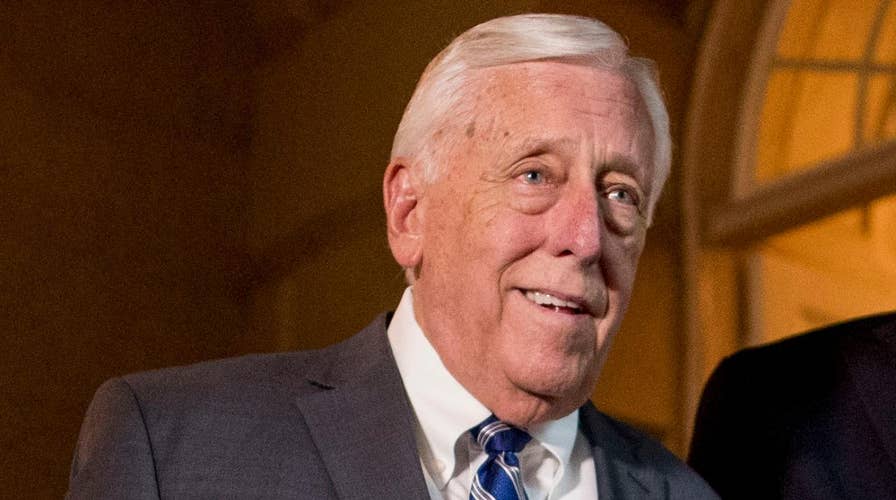Steny Hoyer: What to know
Here are some facts you may not know about U.S. Congressman Steny Hoyer, who represents Maryland's 5th congressional district.
Get all the latest news on coronavirus and more delivered daily to your inbox. Sign up here.
Quarantine Routine is a regular feature that asks political power brokers how their daily lives have changed -- and how they're still doing their jobs -- during the coronavirus crisis.
Rep. Steny Hoyer, D-Md., is a people person.
That affable quality serves him well as House majority leader as he routinely checks the pulse of his Democratic caucus. Normally, he'll collect the concerns of members throughout the day in the halls of Capitol Hill and in conversations on the House floor, beyond the scheduled caucus meetings.
HOUSE PASSES CORONAVIRUS RELIEF BILL
But quarantine changed all that.
"I miss the people," Hoyer said of now working from home.
The No. 2 in the House, Hoyer manages the legislative schedule, coordinates policy priorities and communicates with the press every week on the Democrats' message.
But without the benefit of short conversations throughout the day in between meetings and votes, Hoyer says virtual legislating has been challenging. He's working harder and longer.
With phone conferences as the prime chance to hear from members who are scattered across the country, the participation in the caucus calls has increased and the meetings take more time.
And the stakes couldn't be higher as Hoyer is working on massive coronavirus relief legislation for the country, developing an unprecedented vision for remote voting in the House and helping bring relief for Maryland's 5th Congressional District.
"I'm learning more about how one communicates other than in-person -- as everyone is doing -- and working hard to address the needs of my district and continue to ensure the Congress is doing the people's business," Hoyer said.
Hoyer described how his daily routine has changed in a Q & A with Fox News.
How has your daily routine changed since social distancing measures began?
Hoyer: I have been at home in my district following CDC guidelines and social distancing, and I have only left the house for must-do activities, such as managing floor debate of the CARES Act, participating in debate and voting on the interim funding bill. Therefore, my routine has changed radically. I typically wake up at 6 a.m. and get to the office at 7:15 a.m. I work, vote, talk to Members, meet with constituents and attend events. I usually get home around 9:30 p.m. Now, I'm home all day, but my days are generally even longer. My days have radically changed in the sense that many of the things I previously did in person, I now do over the phone, email, text or video conference.

Rep. Steny Hoyer (D-Md.) conducting a telephone town hall with his constituents.
I am working around the clock to address the needs of my district and work with Members on additional legislation to respond to this crisis. I'm on the phone and iPad communicating with people all day. We have two-hour caucus calls throughout the week to discuss the status of the recovery and additional legislation that is needed to address the economic and public health needs of the American people.
I have been holding my weekly meeting with the Chairs of the committees over the phone to coordinate with them on legislation and oversight needed to respond to the crisis, as well as other business that must be addressed when Congress reconvenes. I'm holding my weekly press conference over the phone to communicate with the press and the public on the work we are doing. I've been holding telephone town halls with 11,000+ constituents on each call to hear directly from them about how they have been affected, answer their questions, and provide an update on the work that I am doing. I also spend a lot of time on the phone with Administration officials, state and local officials, health care experts, local hospitals and health care providers, and other stakeholders to discuss the status of the recovery effort and the needs of my district and state. For example, I spoke with [Rear] Admiral [John] Polowczyk, [who heads FEMA's supply chain task force], recently about getting additional ventilators because Maryland is an emerging hot spot.
I really empathize with and grieve for the millions of people confronting such pain and anxiety and fear of the future right now. That drives me every day to make sure that people are getting the help they need. I am working very hard and spending an extraordinary amount of time on the phone to ensure people are being served and helped.

In this image from video, Rep. Steny Hoyer, D-Md., takes his face covering off as he speaks on the floor of the House of Representatives at the U.S. Capitol in Washington, Thursday, April 23, 2020. (House Television via AP)
What are the biggest challenges in doing your job during this crisis?
Hoyer: My job is a very person-related job. Whether it is connecting with constituents, traveling around the district, or meeting with Members, this job is about connecting with other people. All of that has been substantially curtailed, and it feels strange to be dealing with everyone in a virtual way. However, I'm learning more about how one communicates other than in-person -- as everyone is doing -- and working hard to address the needs of my district and continue to ensure the Congress is doing the people's business.
What do you miss the most about how you did your job before this began?
Hoyer: I miss the people. I'm now FaceTiming with my grandchildren, as opposed to seeing them in person. I miss being with them, with constituents, and with Members. Because this is a people job, and you draw energy and inspiration from people. You can do it virtually, but we're not doing it personally, and I miss that. I miss being on the Floor with Members and talking to them about their lives, their families, what they're interested in. You just don't do that anymore. On our calls, you are focused on the subject of the meeting and addressing the crisis at hand.

House Majority Leader Steny Hoyer of Md., center, accompanied by House Speaker Nancy Pelosi of Calif., left, and House Financial Services Committee Chairwoman Maxine Waters, speaks during a signing ceremony for the Paycheck Protection Program and Health Care Enhancement Act, H.R. 266, after it passed the House on Capitol Hill, Thursday, April 23, 2020, in Washington. (AP Photo/Andrew Harnik)
What surprised you the most about how life has changed?
Hoyer: I'm surprised by how long it takes to communicate with one another. You'd think it would be shorter, but it's longer. Caucus meetings are longer because you don't get the chance to discuss issues with Members in the hallway or on the Floor, so we have longer meetings. On the other hand, we also have a lot higher participation, because it's the only avenue for discussion. It substitutes for all of the ways we used to meet and communicate.
How do you blow off steam?
Hoyer: I take a walk every day. From time to time, I mow my lawn. I like to get outside and get fresh air and get some exercise. I enjoy my time in the yard.













































